- Home
- Julia Quinn
Romancing Mister Bridgerton
Romancing Mister Bridgerton Read online
April is nearly upon us, and with it a new social season here in London. Ambitious Mamas can be found at dress-shops all across town with their Darling Debutantes, eager to purchase that one magical evening gown that they simply know will mean the difference between marriage and spinster-hood
As for their prey—the Determined Bachelors—Mr. Colin Bridgerton once again tops the list of desirable husbands, even though he is not yet back from his recent trip abroad. He has no title, that is true, but he is in abundant possession of looks, fortune, and, as anyone who has ever spent even a minute in London knows, charm.
But Mr. Bridgerton has reached the somewhat advanced age of three-and-thirty without ever showing an interest in any particular young lady, and there is little reason to anticipate that 1824 will be any different from 1823 in this respect.
Perhaps the Darling Debutantes—and perhaps more importantly their Ambitious Mamas—would do well to look elsewhere. If Mr. Bridgerton is looking for a wife, he hides that desire well.
On the other hand, is that not just the sort of challenge a debutante likes best?
LADY WHISTLEDOWN'S SOCIETY PAPERS
ROMANCING MISTER BRIDGERTON
JULIA QUINN
For the women on avonloop, colleagues and friends all— thanks for giving me someone to talk to all day long.
Your support and friendship have meant more to me than I could ever say.
And for Paul, even though the closest thing you'd ever find to a romance in his field is a lecture called "The Kiss of Death."
Acknowledgments
With utmost thanks to Lisa Kleypas and Stephanie Laurens for the gracious use of their characters.
PROLOGUE
On the sixth of April, in the year 1812—precisely two days before her sixteenth birthday—Penelope Featherington fell in love.
It was, in a word, thrilling. The world shook. Her heart leaped. The moment was breathtaking. And, she was able to tell herself with some satisfaction, the man in question—one Colin Bridgerton—felt precisely the same way.
Oh, not the love part. He certainly didn't fall in love with her in 1812 (and not in 1813, 1814, 1815, or—oh, blast, not in all the years 1816-1822, either, and certainly not in 1823, when he was out of the country the whole time, anyway). But his earth shook, his heart leaped, and Penelope knew without a shadow of a doubt that his breath was taken away as well. For a good ten seconds.
Falling off a horse tended to do that to a man.
It happened thus:
She'd been out for a walk in Hyde Park with her mother and two older sisters when she felt a thunderous rumbling under her feet (see above: the bit about the earth shaking). Her mother wasn't paying much attention to her (her mother rarely did), so Penelope slipped away for a moment to see what was about. The rest of the Featheringtons were in rapt conversation with Viscountess Bridgerton and her daughter Daphne, who had just begun her second season in London, so they were pretending to ignore the rumbling. The Bridgertons were an important family indeed, and conversations with them were not to be ignored.
As Penelope skirted around the edge of a particularly fat-trunked tree, she saw two riders coming her way, galloping along hell-for-leather or whatever expression people liked to use for fools on horseback who care not for their safety and well-being. Penelope felt her heart quicken (it would have been difficult to maintain a sedate pulse as a witness to such excitement, and besides, this allowed her to say that her heart leaped when she fell in love).
Then, in one of those inexplicable quirks of fate, the wind picked up quite suddenly and lifted her bonnet (which, much to her mother's chagrin, she had not tied properly since the ribbon chafed under her chin) straight into the air and, splat! right onto the face of one of the riders.
Penelope gasped (taking her breath away!), and then the man fell off his horse, landing most inelegantly in a nearby mud puddle.
She rushed forward, quite without thinking, squealing something that was meant to inquire after his welfare, but that she suspected came out as nothing more than a strangled shriek. He would, of course, be furious with her, since she'd effectively knocked him off his horse and covered him with mud—two things guaranteed to put any gentleman in the foulest of moods. But when he finally rose to his feet, brushing off whatever mud could be dislodged from his clothing, he didn't lash out at her. He didn't give her a stinging set-down, he didn't yell, he didn't even glare.
He laughed.
He laughed.
Penelope hadn't much experience with the laughter of men, and what little she had known had not been kind. But this man's eyes—a rather intense shade of green—were filled with mirth as he wiped a rather embarrassingly placed spot of mud off his cheek and said, "Well, that wasn't very well done of me, was it?"
And in that moment, Penelope fell in love.
When she found her voice (which, she was pained to note, was a good three seconds after a person of any intelligence would have replied), she said, "Oh, no, it is I who should apologize! My bonnet came right off my head, and ..."
She stopped talking when she realized he hadn't actually apologized, so there was little point in contradicting him.
"It was no trouble," he said, giving her a somewhat amused smile. "I—Oh, good day, Daphne! Didn't know you were in the park."
Penelope whirled around to find herself facing Daphne Bridgerton, standing next to her mother, who promptly hissed, "What have you done, Penelope Featherington?" and Penelope couldn't even answer with her stock, Nothing, because in truth, the accident was completely her fault, and she'd just made a fool of herself in front of what was obviously—judging from the expression on her mother's face—a very eligible bachelor indeed.
Not that her mother would have thought that she had a chance with him. But Mrs. Featherington held high matrimonial hopes for her older girls. Besides, Penelope wasn't even "out" in society yet.
But if Mrs. Featherington intended to scold her any further, she was unable to do so, because that would have required that she remove her attention from the all-important Bridgertons, whose ranks, Penelope was quickly figuring out, included the man presently covered in mud.
"I hope your son isn't injured," Mrs. Featherington said to Lady Bridgerton.
"Right as rain," Colin interjected, making an expert sidestep before Lady Bridgerton could maul him with motherly concern.
Introductions were made, but the rest of the conversation was unimportant, mostly because Colin quickly and accurately sized up Mrs. Featherington as a matchmaking mama. Penelope was not at all surprised when he beat a hasty retreat.
But the damage had already been done. Penelope had discovered a reason to dream.
Later that night, as she replayed the encounter for about the thousandth time in her mind, it occurred to her that it would have been nice if she could have said that she'd fallen in love with him as he kissed her hand before a dance, his green eyes twinkling devilishly while his fingers held hers just a little more tightly than was proper. Or maybe it could have happened as he rode boldly across a windswept moor, the (aforementioned) wind no deterrent as he (or rather, his horse) galloped ever closer, his (Colin's, not the horse's) only intention to reach her side.
But no, she had to go and fall in love with Colin Bridgerton when he fell off a horse and landed on his bottom in a mud puddle. It was highly irregular, and highly unromantic, but there was a certain poetic justice in that, since nothing was ever going to come of it.
Why waste romance on a love that would never be returned? Better to save the windswept-moor introductions for people who might actually have a future together.
And if there was one thing Penelope knew, even then, at the age of sixteen years minus two days, it was t
hat her future did not feature Colin Bridgerton in the role of husband.
She simply wasn't the sort of girl who attracted a man like him, and she feared that she never would be.
* * *
On the tenth of April, in the year 1813—precisely two days after her seventeenth birthday—Penelope Featherington made her debut into London society. She hadn't wanted to do it. She begged her mother to let her wait a year. She was at least two stone heavier than she ought to be, and her face still had an awful tendency to develop spots whenever she was nervous, which meant that she always had spots, since nothing in the world could make her as nervous as a London ball.
She tried to remind herself that beauty was only skin deep, but that didn't offer any helpful excuses when she was berating herself for never knowing what to say to people. There was nothing more depressing than an ugly girl with no personality. And in that first year on the marriage mart, that was exactly what Penelope was. An ugly girl with no—oh, very well, she had to give herself some credit—with very little personality.
Deep inside, she knew who she was, and that person was smart and kind and often even funny, but somehow her personality always got lost somewhere between her heart and her mouth, and she found herself saying the wrong thing or, more often, nothing at all.
To make matters even less attractive, Penelope's mother refused to allow Penelope to choose her own clothing, and when she wasn't in the requisite white that most young ladies wore (and which of course didn't flatter her complexion one bit), she was forced to wear yellow and red and orange, all of which made her look perfectly wretched. The one time Penelope had suggested green, Mrs. Featherington had planted her hands on her more-than-ample hips and declared that green was too melancholy.
Yellow, Mrs. Featherington declared, was a happy color and a happy girl would snare a husband.
Penelope decided then and there that it was best not to try to understand the workings of her mother's mind.
So Penelope found herself outfitted in yellow and orange and the occasional red, even though such colors made her look decidedly unhappy, and in fact were positively ghastly with her brown eyes and red-tinged hair. There was nothing she could do about it, though, so she decided to grin and bear it, and if she couldn't manage a grin, at least she wouldn't cry in public.
Which, she took some pride in noting, she never did.
And if that weren't enough, 1813 was the year that the mysterious (and fictitious) Lady Whistledown began publishing her thrice-weekly Society Papers. The single-sheet newspaper became an instant sensation. No one knew who Lady Whistledown really was, but everyone seemed to have a theory. For weeks—no, months, really—London could speak of nothing else. The paper had been delivered for free for two weeks—just long enough to addict the ton—and then suddenly there was no delivery, just paperboys charging the outrageous price of five pennies a paper.
But by then, no one could live without the almost-daily dose of gossip, and everyone paid their pennies.
Somewhere some woman (or maybe, some people speculated, some man) was growing very rich indeed.
What set Lady Whistledown's Society Papers apart from any previous society newssheets was that the author actually listed her subjects' names in full. There was no hiding behind abbreviations such as Lord P------or Lady B------. If Lady Whistledown wanted to write about someone, she used his full name.
And when Lady Whistledown wanted to write about Penelope Featherington, she did. Penelope's first appearance in Lady Whistledown's Society Papers went as follows:
Miss Penelope Featherington's unfortunate gown left the unfortunate girl looking like nothing more than an overripe citrus fruit.
A rather stinging blow, to be sure, but nothing less than the truth.
Her second appearance in the column was no better.
Not a word was heard from Miss Penelope Featherington, and no wonder! The poor girl appeared to have drowned amidst the ruffles of her dress.
Not, Penelope was afraid, anything that would enhance her popularity.
But the season wasn't a complete disaster. There were a few people with whom she seemed able to speak. Lady Bridgerton, of all people, took a liking to her, and Penelope found that she could often tell things to the lovely viscountess that she would never dream of saying to her own mother. It was through Lady Bridgerton that she met Eloise Bridgerton, the younger sister of her beloved Colin. Eloise was also just turned seventeen, but her mother had wisely allowed her to delay her debut by a year, even though Eloise possessed the Bridgerton good looks and charm in abundance.
And while Penelope spent her afternoons in the green-and-cream drawing room at Bridgerton House (or, more often, up in Eloise's bedchamber where the two girls laughed and giggled and discussed everything under the sun with great earnestness), she found herself coming into occasional contact with Colin, who at two-and-twenty had not yet moved out of the family home and into bachelor lodgings.
If Penelope had thought she loved him before, that was nothing compared to what she felt after actually getting to know him. Colin Bridgerton was witty, he was dashing, he had a devil-may-care jokester quality to him that made women swoon, but most of all...
Colin Bridgerton was nice.
Nice. Such a silly little word. It should have been banal, but somehow it fit him to perfection. He always had something nice to say to Penelope, and when she finally worked up the courage to say something back (other than the very basic greetings and farewells), he actually listened. Which made it all the easier the next time around.
By the end of the season, Penelope judged that Colin Bridgerton was the only man with whom she'd managed an entire conversation.
This was love. Oh, this was love love love love love love. A silly repetition of words, perhaps, but that was precisely what Penelope doodled on a ridiculously expensive sheet of writing paper, along with the words, "Mrs. Colin Bridgerton" and "Penelope Bridgerton" and "Colin Colin Colin." (The paper went into the fire the moment Penelope heard footsteps in the hall.)
How wonderful it was to feel love—even the one-sided sort—for a nice person. It made one feel so positively sensible.
Of course, it didn't hurt that Colin possessed, as did all the Bridgerton men, fabulous good looks. There was that famous Bridgerton chestnut hair, the wide and smiling Bridgerton mouth, the broad shoulders, the six-foot height, and in Colin's case, the most devastating green eyes ever to grace a human face.
They were the sort of eyes that haunted a girl's dreams.
And Penelope dreamed and dreamed and dreamed.
* * *
April of 1814 found Penelope back in London for a second season, and even though she attracted the same number of suitors as the year before (zero), the season wasn't, in all honesty, quite so bad. It helped that she'd lost nearly two stone and could now call herself "pleasantly rounded" rather than "a hideous pudge." She was still nowhere near the slender ideal of womanhood that ruled the day, but at least she'd changed enough to warrant the purchase of a completely new wardrobe.
Unfortunately, her mother once again insisted on yellow, orange, and the occasional splash of red. And this time, Lady Whistledown wrote:
Miss Penelope Featherington (the least inane of the Featherington sisters) wore a gown of lemon yellow that left a sour taste in one's mouth.
Which at least seemed to imply that Penelope was the most intelligent member of her family, although the compliment was backhanded, indeed.
But Penelope wasn't the only one singled out by the acerbic gossip columnist. Dark-haired Kate Sheffield was likened to a singed daffodil in her yellow dress, and Kate went on to marry Anthony Bridgerton, Colin's older brother and a viscount to boot!
So Penelope held out hope.
Well, not really. She knew Colin wasn't going to marry her, but at least he danced with her at every ball, and he made her laugh, and every now and then she made him laugh, and she knew that that would have to be enough.
And so Penelope's life continu
ed. She had her third season, then her fourth. Her two older sisters, Prudence and Philippa, finally found husbands of their own and moved away. Mrs. Featherington held out hope that Penelope might still make a match, since it had taken both Prudence and Philippa five seasons to snare husbands, but Penelope knew that she was destined to remain a spinster. It wouldn't be fair to marry someone when she was still so desperately in love with Colin. And maybe, in the far reaches of her mind—in the farthest-back corner, tucked away behind the French verb conjugations she'd never mastered and the arithmetic she never used—she still held out a tiny shred of hope.
Until that day.
Even now, seven years later, she still referred to it as that day.
She'd gone to the Bridgerton household, as she frequently did, to take tea with Eloise and her mother and sisters. It was right before Eloise's brother Benedict had married Sophie, only he didn't know who she really was, and—well, that didn't signify, except that it may have been the one truly great secret in the last decade that Lady Whistledown had never managed to unearth.
Anyway, she was walking through the front hall, listening to her feet tap along the marble tile as she saw herself out. She was adjusting her pelisse and preparing to walk the short distance to her own home (just around the corner, really) when she heard voices. Male voices. Male Bridgerton voices.
It was the three elder Bridgerton brothers: Anthony, Benedict, and Colin. They were having one of those conversations that men have, the kind in which they grumble a lot and poke fun at each other. Penelope had always liked to watch the Bridgertons interact in this manner; they were such a family.
Penelope could see them through the open front door, but she couldn't hear what they were saying until she'd reached the threshold. And in a testament to the bad timing that had plagued her throughout her life, the first voice she heard was Colin's, and the words were not kind.
"... and I am certainly not going to marry Penelope Featherington!"

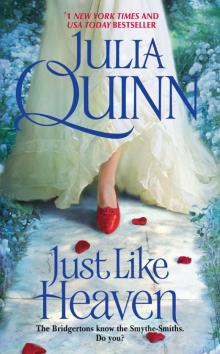 Just Like Heaven
Just Like Heaven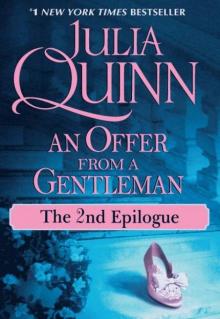 B03.2 An Offer from a Gentleman Ep II
B03.2 An Offer from a Gentleman Ep II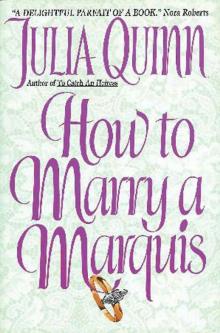 How to Marry a Marquis
How to Marry a Marquis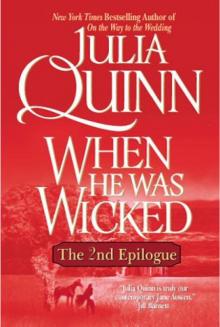 When He Was Wicked: The 2nd Epilogue
When He Was Wicked: The 2nd Epilogue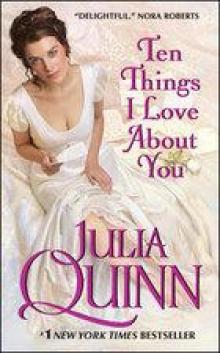 Ten Things I Love About You
Ten Things I Love About You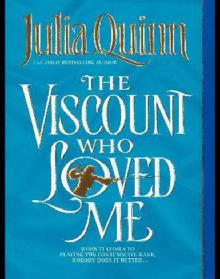 The Viscount Who Loved Me
The Viscount Who Loved Me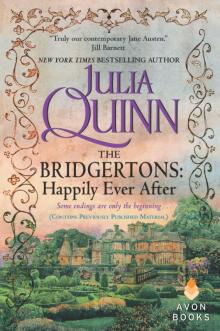 The Duke and I
The Duke and I B05.2 To Sir Philip With Love Ep II
B05.2 To Sir Philip With Love Ep II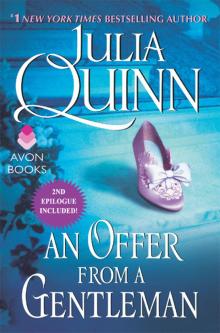 An Offer From a Gentleman: The 2nd Epilogue
An Offer From a Gentleman: The 2nd Epilogue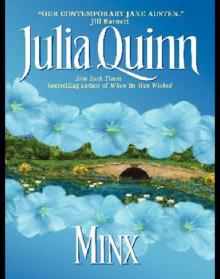 Minx
Minx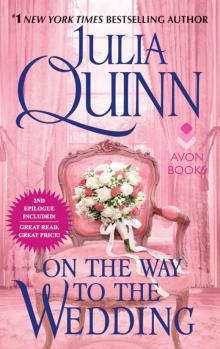 On the Way to the Wedding with 2nd Epilogue
On the Way to the Wedding with 2nd Epilogue Mr. Cavendish, I Presume
Mr. Cavendish, I Presume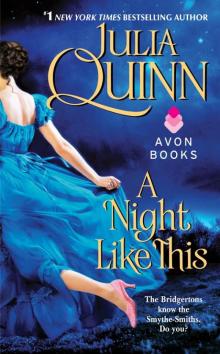 A Night Like This
A Night Like This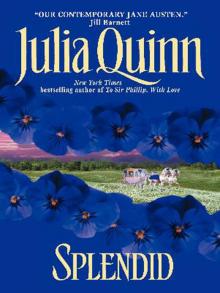 Splendid
Splendid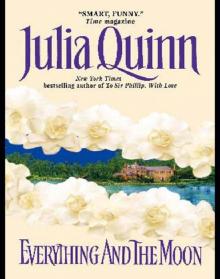 Everything and the Moon
Everything and the Moon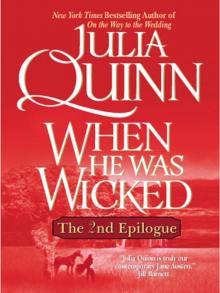 When He Was Wicked
When He Was Wicked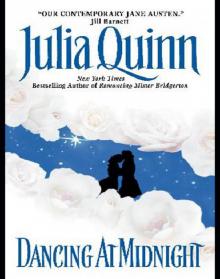 Dancing at Midnight
Dancing at Midnight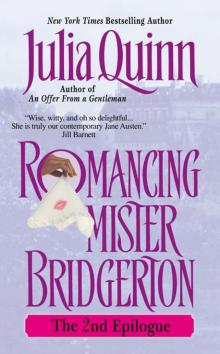 Bridgerton 04: 2nd Epilogue - Romancing Mister Bridgerton
Bridgerton 04: 2nd Epilogue - Romancing Mister Bridgerton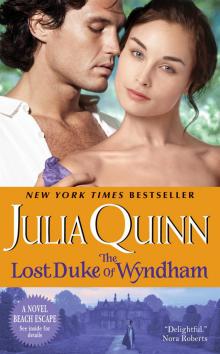 The Lost Duke of Wyndham
The Lost Duke of Wyndham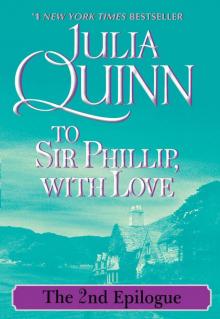 To Sir Phillip, With Love
To Sir Phillip, With Love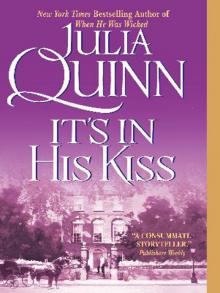 It's in His Kiss
It's in His Kiss The Other Miss Bridgerton
The Other Miss Bridgerton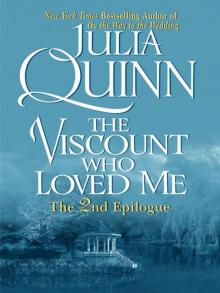 Bridgerton 02: 2nd Epilogue - The Viscount Who Loved Me
Bridgerton 02: 2nd Epilogue - The Viscount Who Loved Me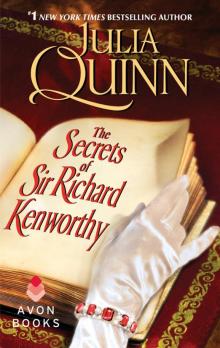 The Secrets of Sir Richard Kenworthy
The Secrets of Sir Richard Kenworthy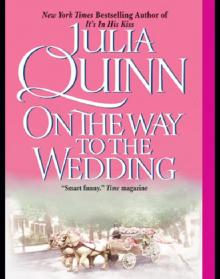 On the Way to the Wedding
On the Way to the Wedding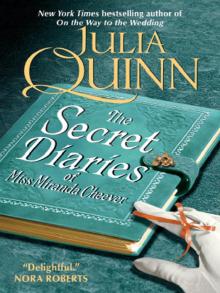 The Secret Diaries of Miss Miranda Cheever
The Secret Diaries of Miss Miranda Cheever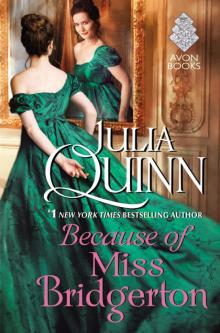 Because of Miss Bridgerton
Because of Miss Bridgerton What Happens in London
What Happens in London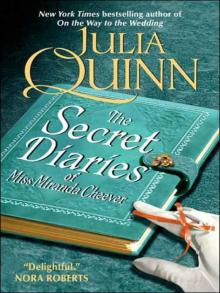 JQuinn - The Secret Diaries of Miss Miranda Cheever
JQuinn - The Secret Diaries of Miss Miranda Cheever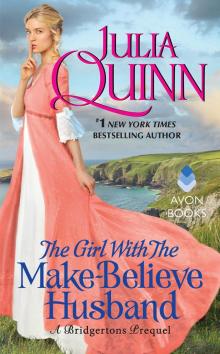 The Girl With the Make-Believe Husband
The Girl With the Make-Believe Husband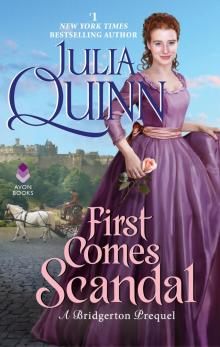 First Comes Scandal
First Comes Scandal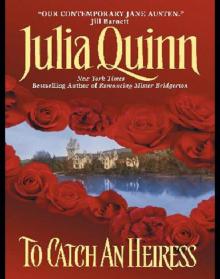 To Catch an Heiress
To Catch an Heiress The Sum of All Kisses
The Sum of All Kisses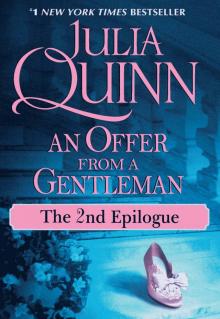 An Offer From a Gentleman
An Offer From a Gentleman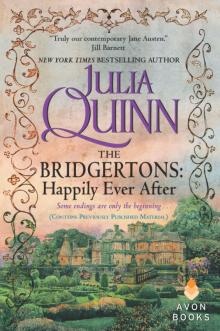 The Bridgertons: Happily Ever After
The Bridgertons: Happily Ever After Bridgerton Collection Volume 1 (Bridgertons)
Bridgerton Collection Volume 1 (Bridgertons)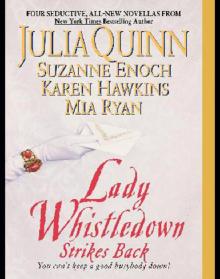 Lady Whistledown Strikes Back
Lady Whistledown Strikes Back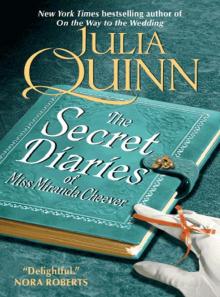 Secret Diaries of Miss Miranda Cheever
Secret Diaries of Miss Miranda Cheever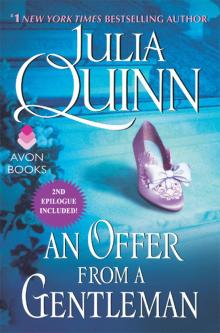 An Offer from a Gentleman with 2nd Epilogue
An Offer from a Gentleman with 2nd Epilogue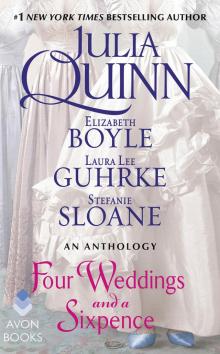 Four Weddings and a Sixpence
Four Weddings and a Sixpence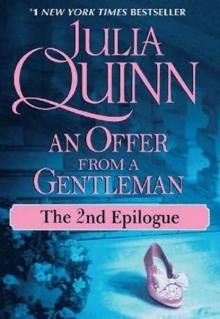 An Offer from a Gentleman: The Epilogue II
An Offer from a Gentleman: The Epilogue II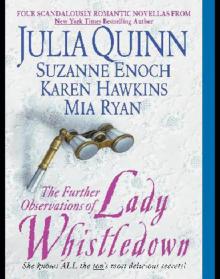 The Further Observations of Lady Whistledown
The Further Observations of Lady Whistledown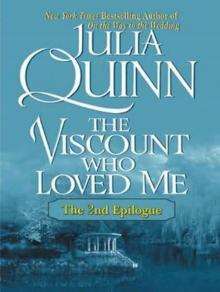 The Viscount Who Loved Me: The Epilogue II
The Viscount Who Loved Me: The Epilogue II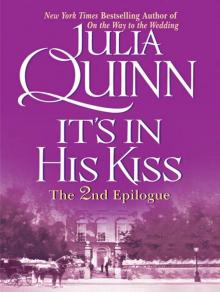 It’s In His Kiss Epilogue II
It’s In His Kiss Epilogue II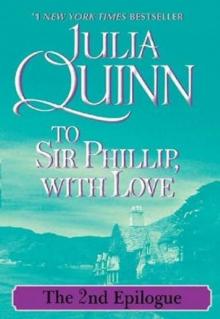 To Sir Phillip, with Love: The Epilogue II
To Sir Phillip, with Love: The Epilogue II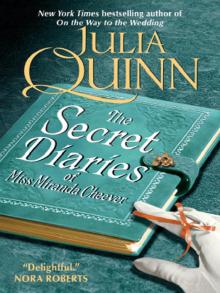 The Secret Diaries of Miss Miranda Cheevers
The Secret Diaries of Miss Miranda Cheevers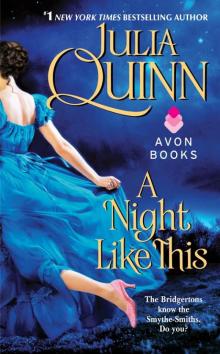 A Night Like This (Smythe-Smith Quartet)
A Night Like This (Smythe-Smith Quartet)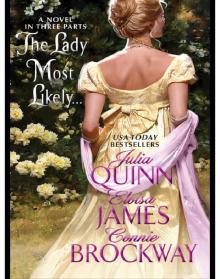 The Lady Most Likely...
The Lady Most Likely...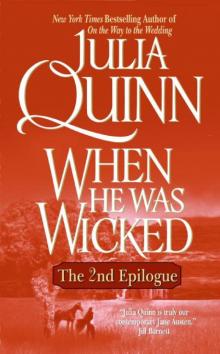 Bridgerton 06: 2nd Epilogue - When He Was Wicked
Bridgerton 06: 2nd Epilogue - When He Was Wicked Just Like Heaven sq-1
Just Like Heaven sq-1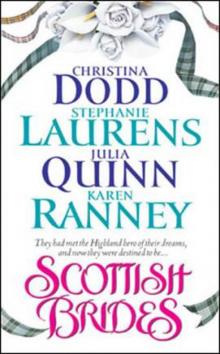 Gretna Greene
Gretna Greene